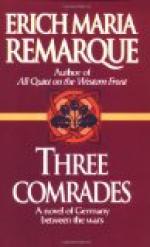“Come, come, ye gentle sheep,
Keep out of waters deep;
Pasture on meadows green
Where grass grows sweet and clean.”
How the trumpet resounded as if some one were weeping in the woods! Even the echo seemed to answer in the same way.
The boys liked the beautiful tune. They knew the words of this song, but Bacha bowed down his proud head as though some great burden were pressing him down.
After they had finished their simple supper, they sat again as usual in front of the hut, Bacha on a stump and the boys at his feet. They were looking one at the other, wondering if they dare ask for some story. He knew so many of them, and when he was in good humor he knew very well how to tell good stories.
“I beg, Bacha, will you not tell us something?” Ondrejko finally asked, and looked at the same time in such a way at Bacha that he would have to be a very hard man to refuse.
Disturbed from his meditation, Bacha looked for a while into the beautiful inquiring eyes, then with a deep breath he began:
“Many years ago I was a boy like you two. I’m telling you this that you may know what you should never become, if the Lord God is not to be very angry at you. I will tell you today something about myself which I have not yet told anybody on earth,” began Filina. He stopped a moment and the boys waited eagerly for him to go on.
“When I was five years old my mother died. My father brought another mother in the house. She was a young, beautiful woman, a widow. With her came a son from her first marriage. We called him Stephen, and when I look at you, Ondrejko, I always have him before me as he entered our hut for the first time. On his head he had a hat with a long band, a cloak thrown over his shoulder, an embroidered shirt, and narrow trousers. He was like a picture of a saint—so beautiful and so lovely.
“I was my father’s youngest child. The older ones died, so I never had a brother, and suddenly he came—and was to be my brother. You love each other—I know. That also reminds me of my childhood. I began to love him more than I could my own brother. We were of equal age, but I was strong and he weak; I was wild and he tame; I was ugly and he beautiful. In spite of this we loved each other, and our parents were well satisfied. They could leave him under my care—because they knew I was able to defend him—and could leave me under his care, because when he was with me I was much more tame.
“Would that it had remained so always. But a proverb says, not in vain, that ’Where the Devil cannot go himself he will send an old woman.’ And he sent her to us. It was your father’s Aunt, your great-aunt, Petrik. She came once to us and asked me aside if the new mother liked me, and was sorry for me that I was a poor orphan. Said she, ’Who has a step-mother has also a stepfather. Your father doesn’t love you as much as he does Stephen.’ She didn’t




